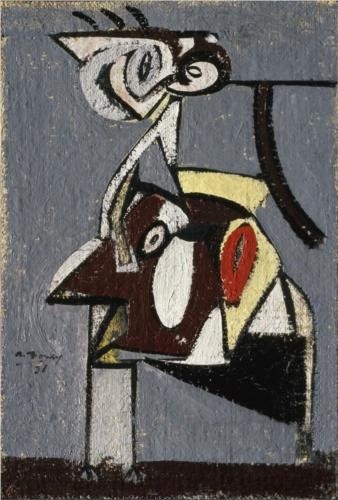Jerome Rothenberg: From 'The Gorky Variations' (in progress), 'Child of an Idumean Night'

(1)
Every hair in his beard was bristling.
Every flag along the border brought war closer,
pierced the father’s heart,
architects & gardeners baled water,
tigers roamed the city,
singers chanting beard to beard.
Jerusalem drew closer to Philistia,
God watching how the holy race leapt from the fire
Mechanics were the last to leave,
all in a row.
American & fat,
fucked senseless.
(2)
They celebrate a crystal solstice,
a sound behind them of a brass harmonica,
like wind inside a swollen udder,
a tumescence & a pustule.
A willow bends & snaps,
a door flies open.
A winter holocaust approaches,
the dead lie frozen,
shoes & teeth piled up,
ploughed underground by tractors.
A willow bends & snaps,
a door flies open.
Down to its final decimal,
the pustule bursts,
their voices sound like avatars,
dancers as pale as doves.
A willow bends & snaps,
a door flies open.
Their father is a jackal,
waves a parchment,
tallow dripping slowly
over a globus written large
.
A willow bends & snaps,
a door flies open.
(3)
If the candle lasts
for days
flash it before
God the Father,
let the testaments
turn rancid,
sprinkle holy water
on your hair.
The father’s heart
may melt,
no longer Master,
a murderer
atop a throne.
So many things
will be repeated,
a tsar will sprinkle water,
up to his hips in dust
the only owner
of his kingdom.
Master of the dust
forever fat,
his language hidden
under languages, the part
he plays forgotten.
Sounding like dull brass,
days dim with
repetition,
worshippers & masters
wait with legs apart,
peace ever distant,
while the locomotive cracks
the idumean night.
Hair covers eyes,
the father’s chest swells,
peace comes slowly,
testaments confound
the senate,
legs & hips
grow fat.
Not brass or iron,
fatness covers all,
a substance drawing light
from wicks,
a master race.
4.xi.11
[NOTE. The last several years have brought me, possibly against my better judgment, into acts of retrospection – a big Reader of works (Eye of Witness) for Black Widow Press & a gathering of uncollected poems (Retrievals) for Junction Press most notable among them. Coincident with this I made a return to a number of earlier works and submitted them to a process I had begun with The Lorca Variations (1993), in which I drew words from translations I had made of Lorca’s Suites & used them (the nouns in particular) to create a new series of poems “that both were & weren’t Lorca.” In “The Gorky Variations” and an accompanying series, “The Jigoku Zoshi Variations,” I use the same process with poems of my own that date back to the middle 1960s, drawing in the present instance from The Gorky Poems published by El Corno Emplumado in 1966 and reprinted in Poems for the Game of Silence in 1971. As an indication of what’s at stake I’ve turned elsewhere to the following from Henri Matisse, as a directive for the transition from old work to new & as a way of moving forward:
One should be able to rework an old work at least once – to make
sure that one has not fallen victim – to one’s nerves or to fate.
– Matisse to Gino Severini
And again:
When you have achieved what you want in a certain area, when
you have exploited the possibilities that lie in one direction, you
must, when the time comes, change course, search for something
new.
Another poem from “The Gorky Variations” can be found here on Poems and Poetics and one from “The Jigoku Zoshi Variations” can be found here. (J.R.)]
Poems and poetics